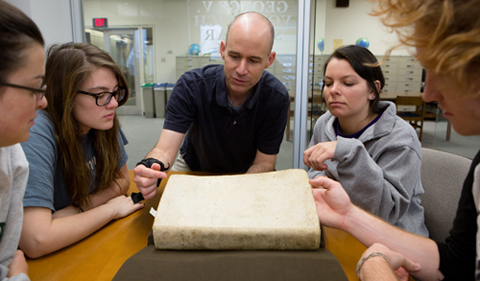
Clockwise, from left: Ohio University students Chloe Farmer, Michele Post, Brittany Centorbi, and Josh Davis, as well as Associate Professor Bob Klein, center, examine an ancient math text during a special presentation at Alden Library on April 18, 2014. During the presentation, students enrolled in Professor Klein’s History of Mathematics course viewed some of the centuries-old math manuscripts that are stored in the library’s Special Collections section. Photo by Lauren Pond
Dr. Robert Klein, Associate Professor of Mathematics, was elected to the Mathematical Association of America Congress as one of six “representatives at large,” representing Teacher Education for a three-year term.
Klein is serving as Interim Associate Dean at Ohio University Lancaster.
“The Mathematical Association of America is the largest professional society that focuses on mathematics accessible at the undergraduate level. Our members include university, college, and high school teachers; graduate and undergraduate students; pure and applied mathematicians; computer scientists; statisticians; and many others in academia, government, business, and industry. We welcome all who are interested in the mathematical sciences,” says the association’s website. The mission of the MAA is “to advance the mathematical sciences, especially at the collegiate level.”
The election was made at the MAA’s MathFest 2017, held July 26-29 in Chicago.
At the conference, Klein organized a session on “My Favorite Math Circle Problem.”
Abstract: A math circle is an enrichment experience that brings mathematics professionals in direct contact with pre-college students and/or their teachers. Circles foster passion and excitement for deep mathematics. Papers in this session highlight either a favorite problem from a math circle, or favorite collection of problems used together for one or two sessions of a math circle. Contributed papers should describe the launch of the problem, what happens during the circle, and ways of “wrapping up”, even if that doesn’t involve answering the problem.
Klein also presented on “Math Unbounded: Math Circles without Borders.”



















Comments